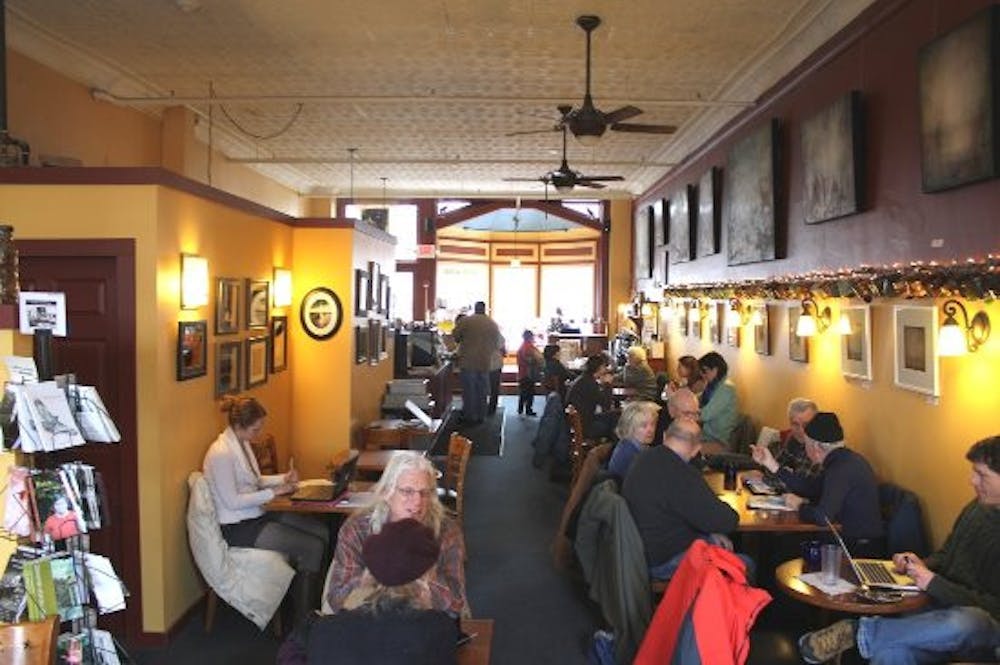In a college town like Middlebury, a local coffeehouse is a staple for study sessions, reunions, first dates and interviews. For the past 12 years, Carol’s Hungry Mind Café has served as a hub for students and professors alike to share ideas away from campus. Three weeks ago, though, owner John Melanson received an eviction notice after months of missing his rent payments.
Melanson said the recent downtown bridge construction has severely hurt the café’s sales and now, even though the building’s landlord has been patient and generous — a letting him pay, he said, “a thousand here and there” — he is left with no choice but to close.
After a few regular customers learned of Melanson’s decision, one of them, Doug Patterson, a local environmental consultant, started an online GoFundMe campaign to keep the café afloat. As of Jan. 23, the campaign had raised more than $2,800 from 46 donors toward the $20,000 goal. Still, Melanson said that while he was grateful for the GoFundMe effort, he doubts he can remain open much longer. (He declined to give a closing date.)
The business’s financial troubles began last summer when the downtown rail bridges closed on Main Street and along Merchants Row. The protracted construction has led to the loss of 14 parking spots near the coffee shop, as well as the obstruction of pedestrian walkways around the café, which is located at 24 Merchants Row.
“If I looked at my books from the year before last, it has cost about $30,000,” Melanson said. “The summers are a very important part. That’s when the tourists come, they sit, they spend 30 bucks and they go.”
Melanson started the café with the late Carol Ross in 2005. Melanson had been widowed a few years earlier, and in 2004 he met Ross through the online dating site Match.com. After meeting in person, Ross pitched the idea of starting a coffee house together. Just a few months later, the business plan was in place and the two opened Carol’s Hungry Mind. In June of that year, Ross was diagnosed with pancreatic cancer and passed away soon after.
Although they met on an online dating site, Melanson and Ross were never romantically involved together. “That doesn’t mean that I didn’t love her. I did,” said Melanson. “I admired her, we shared much of the same musical and literary background.”
Today, Melanson is romantically involved with one of Carol’s closest friends. They started seeing each other after Carol passed away. “I am not only grateful to Carol for giving me the gift of the coffee house but also for introducing me to Karen and making my life whole again,” Melanson said.
Before opening the café, Ross worked at the Vermont Community Foundation and Melanson worked for a furniture design company. For Ross, opening a coffee shop was a longtime dream. She came into Melanson’s life, he said, at a point when he was lacking direction and purpose and so he was easily persuaded to give the café a try. “I did leave my work at Vt. Tubbs, the furniture factory, soon after deciding to start Carol’s,” he said. “It wasn’t a hard decision.”
“I had no idea I would love it so much,” Melanson said in an interview Sunday. “I was a very reclusive type of person. I wouldn’t go out and meet new people. And I knew I was going to be on stage at Carol’s. Now I love it. I go on vacation and I can’t wait to get back.”
Although the shuttering of Carol’s would be life-altering for Melanson, the Middlebury community — professors, students, and those not connected to the college — would also feel its sting. Just last summer, Middlebury Chocolates, another popular spot for meeting over café au lait or cocoa, closed when its owners converted the shop to a wholesale business and moved to Vergennes.
On a campus that can feel cut off from the town’s community, Carol’s provides students with a link to the outside world. Melanson sometimes furthered that connection by befriending students. “I was looking at the painting exhibition at Carol’s last February, and he started a conversation with me out of the blue about art and books,” said Daniel Cho ’19.5. “From then on, our relationship has grown to becoming actual friends who catch up regularly. He’s so eager to get to know students from Middlebury.”
Authors like Jay Parini, a professor of English and creative writing, have written entire books within the café’s confines. The café’s high ceilings, ocher walls and chalkboard menu seem to encourage linger over an espresso. “For many years I considered Carol’s my study,” Parini said. “I sat at a small table at the back and wrote poems and novels. I loved working there. It would be shame to see this café gone from Middlebury.”
Melanson insisted that the college was critical to the café’s success and, as a result, he has no plans to move the business elsewhere. “As I always say, without the college, I wouldn’t be here,” he said. “I wouldn’t open up a place like this in Brandon, let’s say, because the college is essential to it and everything that surrounds the college—the students, the professors.”
Robert Cohen, a professor of English and American literatures, can often be found at Carol’s, planted at a table by the window. He lamented the café’s looming closure in an e-mail, penning an ode to the coffee house that also captured the solipsistic life of the academic. “It’s a good place to write or read or just stare into space, pretending I’m not eavesdropping on my colleagues’ conversations,” Cohen wrote. “Maybe for those of us who spend a lot of time in our own heads, the buzz of human discourse in the background serves as an important lifeline.”
As businesses come and go in Middlebury, the college has realized its own stake in a vibrant downtown, where restaurants and shops are a draw for prospective students. Employees of the college serve on committees and boards like those of the Better Middlebury Partnership (BMP), the Addison County Chamber of Commerce and the Addison County Economic Development Corporation (ACEDC).
Last year, the BMP and the ACEDC secured funding to help merchants whose businesses were disrupted by the construction. Although the grant has since expired, the organizations are now looking for more funding to assist businesses. “We have been an active partner in those conversations,” said David Donahue ’91, an assistant to college president and the college’s director of community relations. “Those organizations are also thinking about new and creative ways to bring energy, and customers, into the downtown.”
Still, some residents argue that local officials are not doing enough. In a recent column in the Addison Independent, Gregory Dennis expressed concern that the $52 million bridge project could have lasting consequences. “Without measures to protect existing businesses and fill empty storefronts,” he wrote, “in a worst-case scenario we could end up with fancy new bridges over trains running through Nowhere: a place that used to be called downtown Middlebury.”
Cohen, the English professor, also imagined the town without a meeting place like Carol’s. “Ideally the presence or absence of one little coffee shop wouldn’t be a world historic event,” he said. “But imagine this town without it. It’s hard to feel good about civic life without some civic spaces that draw people together.”



